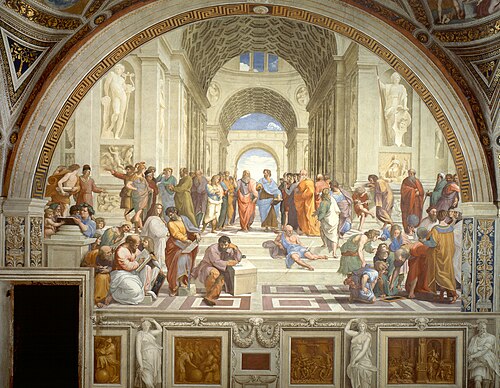Theorynoun
(obsolete) Mental conception; reflection, consideration.
Theorynoun
(sciences) A coherent statement or set of ideas that explains observed facts or phenomena and correctly predicts new facts or phenomena not previously observed, or which sets out the laws and principles of something known or observed; a hypothesis confirmed by observation, experiment etc.
Theorynoun
(uncountable) The underlying principles or methods of a given technical skill, art etc., as opposed to its practice.
Theorynoun
(mathematics) A field of study attempting to exhaustively describe a particular class of constructs.
Theorynoun
A hypothesis or conjecture.
Theorynoun
A set of axioms together with all statements derivable from them. Equivalently, a formal language plus a set of axioms (from which can then be derived theorems).
Theorynoun
A doctrine, or scheme of things, which terminates in speculation or contemplation, without a view to practice; hypothesis; speculation.
Theorynoun
An exposition of the general or abstract principles of any science; as, the theory of music.
Theorynoun
The science, as distinguished from the art; as, the theory and practice of medicine.
Theorynoun
The philosophical explanation of phenomena, either physical or moral; as, Lavoisier's theory of combustion; Adam Smith's theory of moral sentiments.
Theorynoun
a well-substantiated explanation of some aspect of the natural world; an organized system of accepted knowledge that applies in a variety of circumstances to explain a specific set of phenomena;
Theorynoun
a tentative theory about the natural world; a concept that is not yet verified but that if true would explain certain facts or phenomena;
Theorynoun
a belief that can guide behavior;
Theory
A theory is a rational type of abstract thinking about a phenomenon, or the results of such thinking. The process of contemplative and rational thinking is often associated with such processes as observational study or research.
Philosophynoun
The love of wisdom.
Philosophynoun
(uncountable) An academic discipline that seeks truth through reasoning rather than empiricism.
Philosophynoun
(countable) A comprehensive system of belief.
Philosophynoun
(countable) A view or outlook regarding fundamental principles underlying some domain.
Philosophynoun
(countable) A general principle (usually moral).
Philosophynoun
(archaic) A broader branch of (non-applied) science.
Philosophynoun
A calm and thoughtful demeanor; calmness of temper.
Philosophynoun
synonym of small pica|nodot=1.
Philosophyverb
To philosophize.
Philosophynoun
Literally, the love of, inducing the search after, wisdom; in actual usage, the knowledge of phenomena as explained by, and resolved into, causes and reasons, powers and laws.
Philosophynoun
A particular philosophical system or theory; the hypothesis by which particular phenomena are explained.
Philosophynoun
Practical wisdom; calmness of temper and judgment; equanimity; fortitude; stoicism; as, to meet misfortune with philosophy.
Philosophynoun
Reasoning; argumentation.
Philosophynoun
The course of sciences read in the schools.
Philosophynoun
A treatise on philosophy.
Philosophynoun
a belief (or system of beliefs) accepted as authoritative by some group or school
Philosophynoun
the rational investigation of questions about existence and knowledge and ethics
Philosophynoun
any personal belief about how to live or how to deal with a situation;
Philosophynoun
the study of the fundamental nature of knowledge, reality, and existence, especially when considered as an academic discipline.
Philosophynoun
a particular system of philosophical thought
Philosophynoun
the study of the theoretical basis of a particular branch of knowledge or experience
Philosophynoun
a theory or attitude that acts as a guiding principle for behaviour
Philosophy
Philosophy (from Greek: φιλοσοφία, philosophia, 'love of wisdom') is the study of general and fundamental questions, such as those about existence, reason, knowledge, values, mind, and language. Such questions are often posed as problems to be studied or resolved.

















